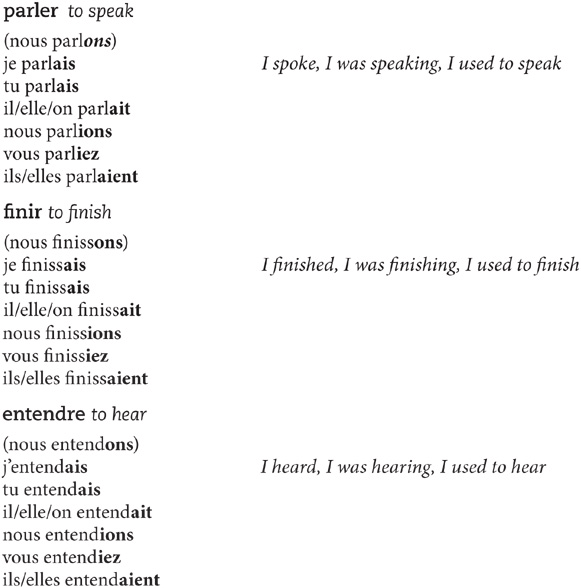
Like the passé composé, the imperfect (l’imparfait) is a past tense. But unlike the passé composé, which denotes actions of limited (short or long) duration, the imperfect expresses actions and situations that lasted an indeterminate amount of time (he had a lot of money), occurred an unspecified number of times (she went to church every Sunday), or were in progress, often when something else happened (it was raining [when they arrived]). The main characteristic of the imperfect is the unlimited aspect. If you do not know at what specific time the action you are describing took place, or how long it lasted, you will generally use the imperfect.
The imperfect tense is translated into English by the past progressive form (I was playing), indicating an action that was going on by used to + infinitive (I used to play) and would + infinitive (I would play), expressing a habitual past action, and by the simple past (I played), but only if the action was repeated, ongoing, or of unlimited duration.
A more detailed description of the use of the imperfect will follow the review of its formation.
The stem of the imperfect tense of all verbs (except être) is found by dropping the -ons ending from the nous form of the present tense. The imperfect endings are: -ais, -ais, -ait, -ions, -iez, -aient. These endings are valid for all verbs, regular and irregular.
A. To conjugate a regular -er, -ir, or -re ending verb in the imperfect tense, follow the models given below.

 The endings -ais, -ait, and -aient have the same pronunciation. They are all pronounced [ε].
The endings -ais, -ait, and -aient have the same pronunciation. They are all pronounced [ε].
 Verbs ending in -cer have a cédille under the c in all persons of the imperfect, except in the nous and vous forms, to conserve the sound [s]. In these persons, the cédille is not needed under the c since the following i makes the c sound [s].
Verbs ending in -cer have a cédille under the c in all persons of the imperfect, except in the nous and vous forms, to conserve the sound [s]. In these persons, the cédille is not needed under the c since the following i makes the c sound [s].

 Verbs ending in -ger, such as voyager (to travel), partager (to share), déménager (to move), etc., insert an e after the g in all persons of the imperfect, except in the nous and vous forms, to conserve the sound [
Verbs ending in -ger, such as voyager (to travel), partager (to share), déménager (to move), etc., insert an e after the g in all persons of the imperfect, except in the nous and vous forms, to conserve the sound [ ]. In these persons, the inserted e is not needed since the following i makes the g sound [
]. In these persons, the inserted e is not needed since the following i makes the g sound [ ].
].

 Verbs with stems that end in -i, such as étudier (to study), remercier (to thank), etc., have a double i in the nous and vous forms.
Verbs with stems that end in -i, such as étudier (to study), remercier (to thank), etc., have a double i in the nous and vous forms.

B. Since the irregular verbs also derive their imperfect stem from the first-person plural of the present tense, you will easily find this stem if you know the present tense of these verbs. Once you have found the stem, all you need to do is add the appropriate endings. Here are some examples:
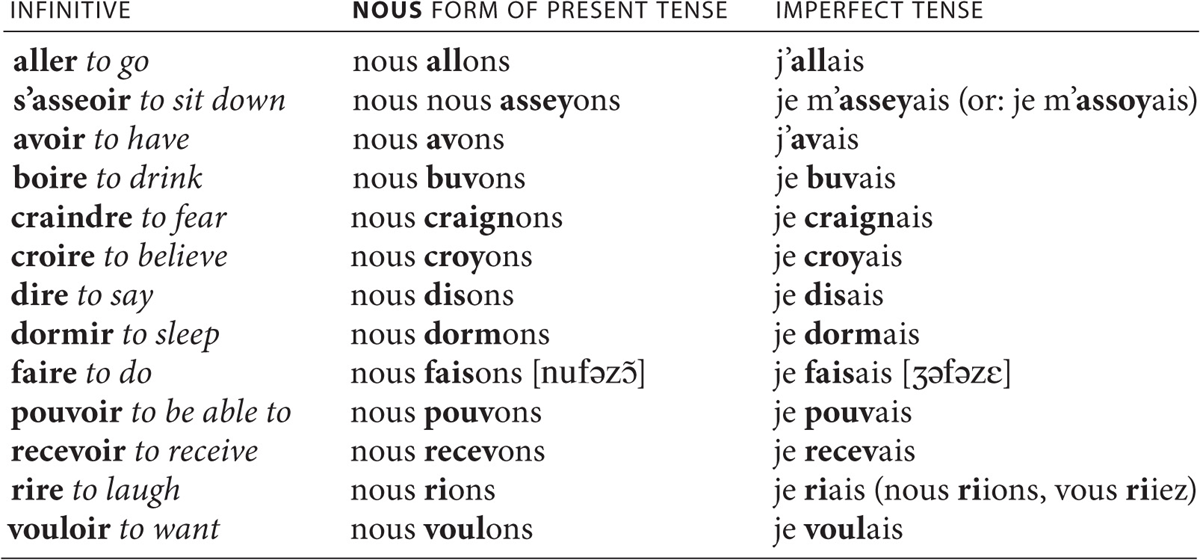
C. The verb être is the only verb that has an irregular stem (ét-) in the imperfect tense. Here is its conjugation:

D. The imperfect forms of the impersonal verbs falloir, pleuvoir, and neiger (which do not exist in the nous form) are as follows:

EXERCICE
6•1
Est-ce vrai ou faux?
Quand j’étais petit(e),…
_______ 1. je jouais avec des poupées.
_______ 2. je regardais rarement des dessins animés.
_______ 3. j’avais peur des araignées (spiders).
_______ 4. j’allais souvent au zoo.
_______ 5. je ne pleurais jamais.
_______ 6. j’obéissais toujours à mes parents.
_______ 7. je ne buvais pas de lait.
_______ 8. je mangeais beaucoup de bonbons.
_______ 9. j’étais toujours heureux (heureuse).
_______ 10. je ne riais pas.
Donnez l’imparfait des verbes entre parenthèses.
1. À l’époque, je (travailler) ______________ à l’ambassade.
2. Il (jouer) ______________ souvent du piano.
3. Stéphanie (perdre) ______________ ses clés fréquemment.
4. Nous (remercier) ______________ rarement nos parents.
5. Est-ce que tu (partager) ______________ tes jouets avec tes frères et sœurs quand tu (être) ______________ petit(e)?
6. L’école (commencer) ______________ à huit heures tous les matins.
7. Il (falloir) ______________ se dépêcher chaque jour.
8. Chaque fois qu’elle (mentir) ______________ elle (rougir) ______________.
9. Nous (faire) ______________ du ski chaque hiver.
10. Ils (dormir) ______________ quand le cambrioleur est entré dans la maison.
11. Pourquoi (rire) ______________ -vous tout le temps?
12. Nous (croire) ______________ que la situation (aller) ______________ s’améliorer.
13. Il (pleuvoir) ______________ quand elle est partie.
14. Il ne (pleurer) ______________ pas.
15. Autrefois, j’ (avoir) ______________ un chien et un chat.
16. D’habitude, j’ (aller) ______________ au gymnase avant de rentrer.
17. Il (neiger) ______________ quelquefois dans mon pays.
18. Comment (s’appeler) ______________ vos amis?
19. À quelle heure (prendre) ______________ -tu le petit déjeuner le dimanche?
20. Le samedi, nous (se lever) ______________ tard.
A. The imperfect is used to describe habitual or repeated actions in the past. Often, the verb in the imperfect tense is accompanied by an expression of time that indicates or implies repetition, such as:
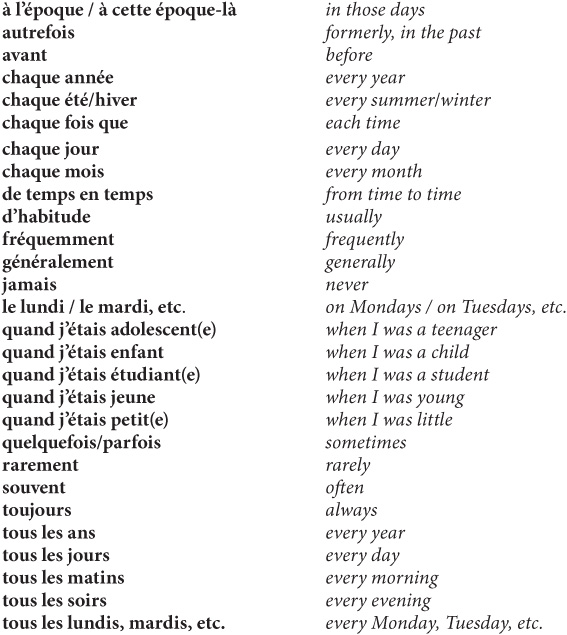
Traduisez en français les phrases suivantes.
1. My grandmother went to church every Sunday. ______________________________________
2. They (masc.) got up early every morning. ______________________________________
3. She frequently went out. ______________________________________
4. When I was little, I watched cartoons all the time. ______________________________________
5. You (fam.) played the guitar every day. ______________________________________
6. We ate together from time to time. ______________________________________
7. In those days, my parents and I lived in Rome. ______________________________________
8. You (pol.) always forgot your glasses. ______________________________________
9. I rarely saw him. ______________________________________
10. Now, I weigh sixty-five kilos; before I weighed fifty-five kilos. ______________________________________
11. Each time he had an exam, he slept badly. ______________________________________
12. When she was a child, she liked ice cream a lot. ______________________________________
When the imperfect describes repeated actions in the past, the English expressions used to (+ infinitive) and would (+ infinitive) can be seen as the equivalent of this tense, because used to and would indicate that an action or situation occurred an unknown number of times.
Traduisez en français les phrases suivantes.
1. They used to travel a lot. ______________________________________
2. Where did you (pol.) used to live? ______________________________________
3. You (fam.) used to read a lot of comics. ______________________________________
4. My friend used to call me every night. ______________________________________
5. I used to go to bed early. ______________________________________
6. She used to drink a glass of milk every morning. ______________________________________
7. We used to see each other often. ______________________________________
8. They (masc.) used to complain about (de) everything. ______________________________________
EXERCICE
6•5
Traduisez en français les phrases suivantes.
1. Each time the teacher would enter, all the students would get up. ______________________________________
2. He would always help me. ______________________________________
3. When we lived in France, we would drink wine for lunch and dinner. ______________________________________
4. When I was a student, I would eat in the dining commons (au resto-U) every day. ______________________________________
5. My mom would visit me once a month (une fois par mois). ______________________________________
6. Each time, she would bring money, gifts, and treats (des friandises [f.pl.]). ______________________________________
7. I would never miss class. ______________________________________
8. My housemates and I would study in the library every afternoon. ______________________________________
9. In the evenings (le soir), we would go out together and we would have a good time. ______________________________________
B. The imperfect is also used for an action that was in progress for an unknown period of time or for two actions that were going on simultaneously. In English such actions are usually expressed by was/were … -ing.

EXERCICE
6•6
Traduisez en français. Utilisez l’imparfait.
1. The car wasn’t working. ______________________________________
2. I was looking for the remote control. ______________________________________
3. She was wondering where you (pol.) were. ______________________________________
4. Everyone was having a good time. ______________________________________
5. I was thinking about you (à toi) all the time. ______________________________________
6. It was raining cats and dogs (des cordes). ______________________________________
7. The baby was crying. ______________________________________
8. Were they (fem.) telling the truth? ______________________________________
9. What was she doing? ______________________________________
10. You (pol.) were working hard. ______________________________________
11. I was joking (plaisanter). ______________________________________
12. He was listening to the radio while his wife was getting dressed. ______________________________________
The imperfect and the passé composé are used in the same sentence when the action in progress serves as background for another action, which took place while the first action was still going on. The interrupting action is in the passé composé.

EXERCICE
6•7
Traduisez en français les phrases suivantes.
1. I was cleaning the house when the mailman arrived. ______________________________________
2. They (masc.) were playing soccer when it started to rain. ______________________________________
3. Andrée was going to the movies when she met her friends. ______________________________________
4. We were sleeping when someone knocked on the door. ______________________________________
5. You (fam.) were writing a letter when the phone rang. ______________________________________
6. I was driving the children to school when the car broke down. ______________________________________
7. What were you (pol.) saying when I entered the room? ______________________________________
C. The imperfect is used to give descriptions of people (including the indication of their names and ages) and things (including weather) in the past; that is, it shows what someone or something was like rather than what happened.
La jeune femme s’appelait Anne, et elle avait vingt ans. Elle était petite et jolie.
The young woman’s name was Anne, and she was twenty years old. She was short and pretty.
EXERCICE
6•8
Traduisez en français les phrases suivantes.
1. She had green eyes and brown hair. ______________________________________
2. The bridegroom was wearing a tuxedo. ______________________________________
3. The bride was beautiful. ______________________________________
4. How old were you (fam.) at that time? ______________________________________
5. What was the name of your (fam.) neighbor? ______________________________________
6. What was the weather like? ______________________________________
7. It was sunny. ______________________________________
8. He was 1 m 90 tall (= he measured 1 m 90) and weighed one hundred kilos. ______________________________________
9. The appetizers were delicious. ______________________________________
10. The landscape was magnificent. ______________________________________
Note:
 With age, the passé composé expresses to turn a certain age.
With age, the passé composé expresses to turn a certain age.

 With weather, the passé composé is used when a specific or limited time is mentioned.
With weather, the passé composé is used when a specific or limited time is mentioned.

D. The imperfect describes mental, physical, or emotional states of unlimited duration. The following verbs that indicate such states are therefore often used in the imperfect:
adorer to adore
aimer to like
s’attendre à to expect
avoir (faim, peur, mal à la tête, etc.) to be (hungry, afraid, etc.), to have (a headache, etc.)
connaître to know
croire to believe
désirer to wish
détester to detest
espérer to hope
être (malade, fatigué, heureux, etc.) to be (ill, tired, happy, etc.)
penser to think
pouvoir to be able
préférer to prefer
regretter to regret
savoir to know
sembler to seem
se sentir to feel
souhaiter to wish
vouloir to want
EXERCICE
6•9
Traduisez en français les phrases suivantes.
1. She adored children. ______________________________________
2. I hoped to be famous someday. ______________________________________
3. He didn’t expect that (cela). ______________________________________
4. They (masc.) were afraid. ______________________________________
5. She didn’t want to leave. ______________________________________
6. Were you (fam.) cold? ______________________________________
7. Robert had a fever (de la fièvre). ______________________________________
8. Did you (pol.) know this person? ______________________________________
9. Did he believe this story? ______________________________________
10. Sophie hated red; she preferred purple. ______________________________________
11. They (masc.) felt guilty (coupable). ______________________________________
12. I was disappointed. ______________________________________
13. Were they (masc.) in a good mood (de bonne humeur)? ______________________________________
14. I thought (= believed) that you (fam.) didn’t like that (ça). ______________________________________
15. They (fem.) didn’t know that he was ill. ______________________________________
But: When the mental, physical or emotional state is momentary, of limited duration, or if it changes or occurs suddenly (as is the case in the following examples), the passé composé is used with the verbs listed above.

E. The imperfect is also used to indicate the time of day, the day of the week, the date, the month, the year, and seasons in the past.

EXERCICE
6•10
Traduisez en français les phrases suivantes.
1. What time was it when you (fam.) came home? ______________________________________
2. It was three o’clock. ______________________________________
3. It was noon when we had lunch. ______________________________________
4. It was a quarter to five when she called. ______________________________________
5. What day was it? —It was Thursday. ______________________________________
6. It was the first of January. ______________________________________
7. It was too late. ______________________________________
F. Other uses of the imperfect tense
The imperfect is also used after si
 in exclamations to express a wish (here, si is generally followed by seulement)
in exclamations to express a wish (here, si is generally followed by seulement)

 in questions to express a suggestion or a supposition made in the present (English: What if …? How about … -ing?)
in questions to express a suggestion or a supposition made in the present (English: What if …? How about … -ing?)

The imperfect is the only past tense used when the following expressions are in a past context.

venir de + (inf.) to have just (done sth)

être en train de + (inf.) to be in the process of (doing sth)

être sur le point de + (inf.) to be about to (do sth)

For the use of the imperfect after depuis, see “The uses of the pluperfect tense,” page 136. For the use of the imperfect in conditional sentences, see Chapter 10, “The conditional,” page 174.
EXERCICE
6•11
Traduisez en français les phrases suivantes.
1. If only I had more time! ______________________________________
2. What if we (on) went to the movies tonight? ______________________________________
3. I was going to give her a gift, but I changed my mind. ______________________________________
4. She was going to buy a camera, but she didn’t have enough money. ______________________________________
5. We were going to do the laundry, but the washing machine was broken. ______________________________________
6. What were you (fam.) going to say? ______________________________________
7. They (masc.) believed that the strike was going to stop. ______________________________________
8. I knew that this (ça) was going to be difficult. ______________________________________
9. We had just moved. ______________________________________
10. They (masc.) had just arrived when I saw them. ______________________________________
11. She was in the process of washing the dishes. ______________________________________
12. They (masc.) were about to lose patience. ______________________________________
Nicole parle de son enfance. Traduisez en français ce qu’elle raconte.
When I was little, my grandmother always came to visit us at Christmas. It was a long trip for her, because we lived in the United States, and she came from France. Therefore, her arrival was a big event for me, and I always anticipated it with great joy. Every year, my grandma spoiled me with many gifts, and there was always chocolate and a new doll. When I was older, she brought me CDs with French songs, which (que) I adored, and she would continue to offer me chocolate. During her stay she would cook wonderful dishes, and her cookies were a delight. She always made a bûche de Noël for us, and we celebrated a French Christmas in America.
VOCABULAIRE


Now that you have learned two past tenses, the passé composé and the imperfect, you will have to distinguish between them. Remember that any French verb can be used in either tense. It is the context that determines which tense must be used. The following guidelines that contrast the most frequent uses of the passé composé and the imperfect will help you choose the right tense in a given context. Remember the following:
The imperfect emphasizes habit, continuity, and unlimited duration. It describes repeated, ongoing, non-completed past actions or states, without indicating their beginning or end. The passé composé stresses limited duration and completion. It presents past actions or states as finished at a specific moment or as completed within a limited period of time.
 The imperfect expresses a habitual action or state that was repeated an unspecified number of times within an unlimited period of time. (English: used to or would + verb).
The imperfect expresses a habitual action or state that was repeated an unspecified number of times within an unlimited period of time. (English: used to or would + verb).
 The passé composé expresses an action or state that occurred only once or was repeated a specified number of times and/or within a limited period of time.
The passé composé expresses an action or state that occurred only once or was repeated a specified number of times and/or within a limited period of time.
 The imperfect describes an action or state that was going on for an unlimited time in the past, without indication of a beginning or end.
The imperfect describes an action or state that was going on for an unlimited time in the past, without indication of a beginning or end.
 The passé composé describes an action or state that was completed either at a precise moment or within a specified period of time.
The passé composé describes an action or state that was completed either at a precise moment or within a specified period of time.

 The imperfect describes an ongoing action that is the background for another action that interrupted it (English: was/were … -ing). The other action is in the passé composé.
The imperfect describes an ongoing action that is the background for another action that interrupted it (English: was/were … -ing). The other action is in the passé composé.
 The passé composé describes a momentary action that occurred while a continuous action was going on. The ongoing action is in the imperfect.
The passé composé describes a momentary action that occurred while a continuous action was going on. The ongoing action is in the imperfect.

 The imperfect describes two or more actions or states that were going on at the same time.
The imperfect describes two or more actions or states that were going on at the same time.
 The passé composé describes two or more actions or states that happened consecutively.
The passé composé describes two or more actions or states that happened consecutively.

EXERCICE
6•13
Passé composé ou imparfait? Remplissez les tirets avec la forme correcte du verbe entre parenthèses.
1. Il (neiger) ______________ cette nuit.
2. Est-ce qu’il (neiger) ______________ quand tu es sorti(e)?
3. Quel temps (faire) ______________ -il? —Il (faire) ______________ froid.
4. Il (faire) ______________ froid pendant presque une semaine.
5. Cette année nous (partir) ______________ en vacances en août.
6. Avant, nous (partir) ______________ en vacances en juillet.
7. Quand j’étais adolescent(e), je (jouer) ______________ toujours au golf.
8. La semaine dernière je (jouer) ______________ deux fois au golf.
9. Éloïse (travailler) ______________ dans cette usine quand je l’ai connue.
10. Est-ce qu’elle y (travailler) ______________ entre 2004 et 2006?
11. Ils (déménager) ______________ il y a trois jours.
12. Autrefois, ils (déménager) ______________ assez souvent.
13. À l’époque, les jeunes gens (se marier) ______________ plus tôt.
14. Ils (se marier) ______________ le week-end dernier.
15. Quand elle (venir) ______________ à Paris la dernière fois, elle (descendre) ______________ dans cet hôtel.
16. Chaque fois qu’elle (venir) ______________ à Paris, elle (descendre) ______________ dans cet hôtel.
EXERCICE
6•14
Passé composé ou imparfait? Traduisez en français les phrases suivantes.
1. Every winter, we went skiing. ______________________________________
2. We went skiing last week. ______________________________________
3. He went to the flea market (au marché aux puces) last Sunday. ______________________________________
4. He used to (= would) go to the flea market every Sunday. ______________________________________
5. When I was a child, I always had the same dream. ______________________________________
6. I had a bad dream last night. ______________________________________
7. I would always work from eight A.M. until five P.M. ______________________________________
8. Yesterday, I worked from eight A.M. until five P.M. ______________________________________
9. We were waiting for the bus. ______________________________________
10. We waited for the bus for one hour. ______________________________________
11. Last year, they (masc.) ate out several times. ______________________________________
12. I was cleaning (ranger) my room while he was sleeping. ______________________________________
 The imperfect describes a mental, physical, or emotional state of unlimited duration.
The imperfect describes a mental, physical, or emotional state of unlimited duration.
 The passé composé describes a mental, physical, or emotional state of limited duration or the sudden occurrence or change of such a state.
The passé composé describes a mental, physical, or emotional state of limited duration or the sudden occurrence or change of such a state.
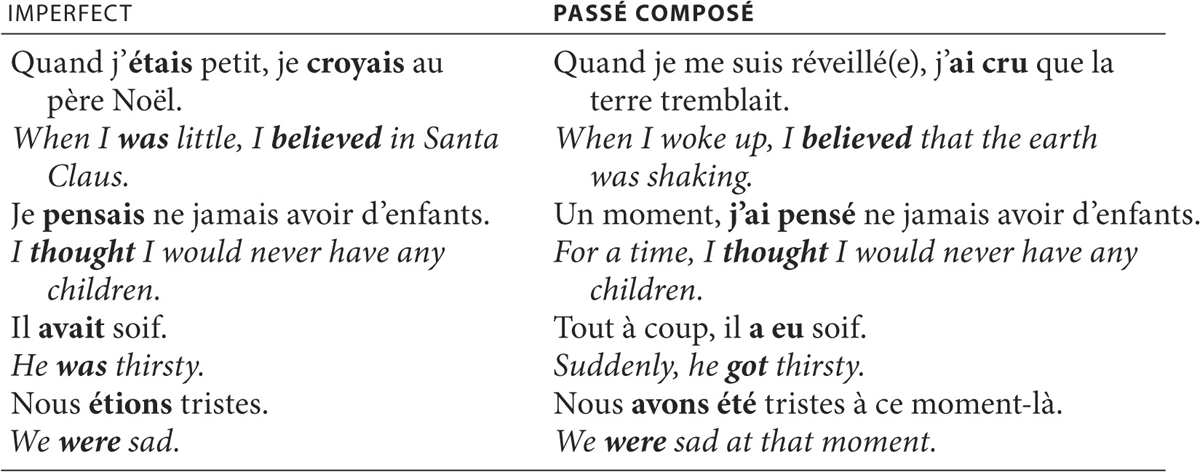
 The imperfect is used with devoir, connaître, savoir, pouvoir, and vouloir to express was supposed to, knew, could, and wanted.
The imperfect is used with devoir, connaître, savoir, pouvoir, and vouloir to express was supposed to, knew, could, and wanted.
 The passé composé is used with devoir, connaître, savoir, pouvoir, and vouloir to express had to, met, found out, managed to, failed to, tried to, and refused to.
The passé composé is used with devoir, connaître, savoir, pouvoir, and vouloir to express had to, met, found out, managed to, failed to, tried to, and refused to.
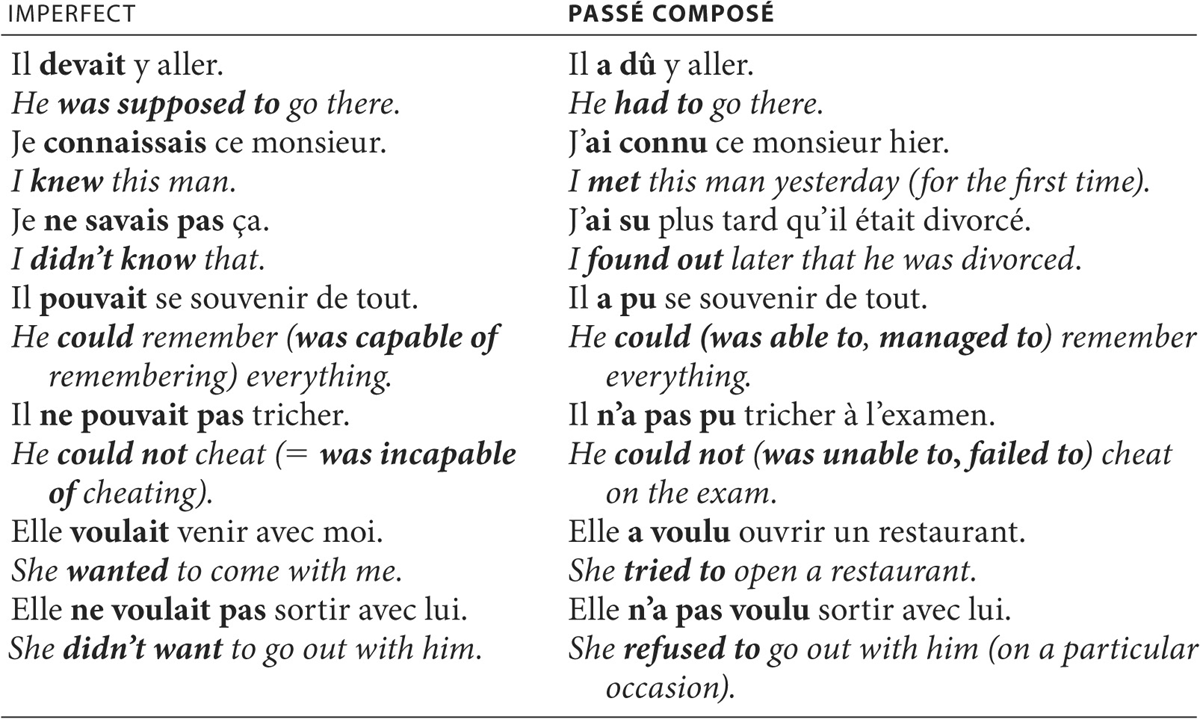
 The imperfect is used with toujours and jamais for actions and situations that occurred repeatedly in the past but do not reach into the present.
The imperfect is used with toujours and jamais for actions and situations that occurred repeatedly in the past but do not reach into the present.
 The passé composé is used with toujours and jamais for actions and situations that occurred on a regular basis in the past and continue to do so in the present.
The passé composé is used with toujours and jamais for actions and situations that occurred on a regular basis in the past and continue to do so in the present.

 The imperfect describes what someone or something was/looked like.
The imperfect describes what someone or something was/looked like.
 The passé composé describes what happened, what someone did.
The passé composé describes what happened, what someone did.
 The imperfect describes what age someone had.
The imperfect describes what age someone had.
 The passé composé describes what age someone turned at a specific time.
The passé composé describes what age someone turned at a specific time.

EXERCICE
6•15
Passé composé ou imparfait? Traduisez en français les phrases suivantes. (Do not translate the English tips in parentheses.)
1. I have never liked peanut butter (and I still don’t). ______________________________________
2. I didn’t like peanut butter when I was a child. ______________________________________
3. My daughter never played with dolls when she was little. ______________________________________
4. I have always dreamed of going on a cruise (and I still do). ______________________________________
5. When I was young, I always dreamed of going on a cruise. ______________________________________
6. My son turned seventeen last Wednesday. ______________________________________
7. She was eighteen years old when she arrived at the university. ______________________________________
8. Did you (fam.) know this woman? ______________________________________
9. Where did you (fam.) meet your wife? ______________________________________
10. He didn’t know how to cook. ______________________________________
11. He found out that it was an error (une erreur). ______________________________________
12. I believed that I was going to die. ______________________________________
13. For a moment (Un instant), I believed that I was going to die. ______________________________________
14. She had a headache. ______________________________________
15. Suddenly, she got a headache. ______________________________________
EXERCICE
6•16
Imparfait ou passé composé? Mettez les verbes au temps qui convient.
1. Je (dormir) ______________ déjà quand mon mari (rentrer) ______________.
2. Quand je (habiter) ______________ dans ce quartier, je (aller) ______________ tous les jours au bureau à pied.
3. Il (être) ______________ une fois (Once upon a time there was) un gros loup méchant qui (vivre) ______________ dans une forêt toute noire.
4. Il (vivre) ______________ au Portugal jusqu’en 2004.
5. Pour son vingtième anniversaire, ses parents lui (offrir) ______________ une montre en ______________ or.
6. Quand je (être) ______________ célibataire, je (penser) ______________ que rien ne (être) ______________ plus beau que le mariage.
7. Qu’est-ce que vous (penser) ______________ de moi la première fois que vous m’avez vu(e)?
8. Tous les soirs, nous (jouer) ______________ à des jeux vidéo avant de nous coucher.
9. Notre voyage à travers le Brésil (durer) ______________ trente jours.
10. Je (descendre) ______________ l’escalier quand je (entendre) ______________ le téléphone sonner.
11. Napoléon (naître) ______________ à Ajaccio et (terminer) ______________ ses jours à Sainte-Hélène.
12. D’abord, ils (lire) ______________ le journal, puis ils (prendre) ______________ une douche, et ensuite ils (se coucher) ______________.
Traduction. Utilisez le passé composé et l’imparfait, selon le cas.
It was Sunday afternoon, and it was raining. Everything was quiet in the city, and there wasn’t anyone in the streets. Suddenly, two gangsters arrived on a motorcycle. They were wearing masks, and one of them held a gun in his right hand. They turned around in order to see whether someone was following them. They did not see the man who was watching them from his window. The two thieves entered the bank, opened the safe, took the money and jewelry, and put everything in a big bag. In the meantime, the witness called the police who (qui) arrived immediately. When the robbers came out of the building, the policemen, who were waiting for them, arrested them and took them to jail.
VOCABULAIRE

Dans le passage suivant, choisissez l’imparfait ou le passé composé. Faites l’élision si c’est nécessaire.
Salut Élodie,
Ton mail me (faisait/a fait) (1) ______________ très plaisir. Je regrette de ne pas avoir répondu plus tôt, mais je (étais/ai été) (2) ______________ très occupé, et mon ordinateur (ne fonctionnait pas/n’a pas fonctionné) (3) ______________ correctement. Tu (voulais/as voulu) (4) ______________ savoir comment (étaient/ont été) (5) ______________ mes vacances. Je vais donc essayer de te parler de tout ce que je (ai fait/faisais) (6) ______________ pendant les vacances. Je (ai fini/finissais) (7) ______________ les cours à l’université le 26 juin. Le 8 juillet, je (partais/suis parti) (8) ______________ pour le Québec. Je (ai pu/pouvais) (9) ______________ me rendre compte que la façon de vivre des Canadiens est très différente de la nôtre. Malheureusement, je (n’ai pas pu/ne pouvais pas) (10) ______________ visiter beaucoup d’endroits car il (a plu/pleuvait) (11) ______________ tout le temps. Je (suis resté/restais) (12) ______________ au Canada trois semaines et je (suis revenu/revenais) (13) ______________ en France le 28 juillet. Le 31, je (ai visité/visitais) (14) ______________ Lyon. J’y (ai rencontré/rencontrais) (15) ______________ mes amis, et on (s’amusait bien/s’est bien amusés) (16) ______________. Puis, début août, je (allais/suis allé) (17) ______________ chercher à la gare une Anglaise qui (venait/est venue) (18) ______________ visiter Marseille.
Je lui (ai donc montré/montrais donc) (19) ______________ ma ville natale. La semaine d’après, je (l’ai laissée/la laissais) (20) ______________ à l’aéroport de Nice où elle (attendait/a attendu) (21) ______________ un avion pour Rome. Je (passais/ai passé) (22) ______________ cinq jours merveilleux avec elle, et j’espère bien la revoir l’année prochaine. Après ça, je (ne faisais rien/n’ai rien fait) (23) ______________ jusqu’au 15 août. Le lendemain, je (montais/suis monté) (24) ______________ à Paris avec des amis et je (suis resté/restais) (25) ______________ quelques jours là-bas. Je (allais/suis allé) (26) ______________ t’envoyer une carte postale, mais je (n’avais pas/n’ai pas eu) (27) ______________ le temps d’en acheter une. À mon retour, je (devais/ai dû) (28) ______________ me préparer pour la rentrée. Voilà mes vacances résumées.
Bon, je vais te laisser pour aujourd’hui. J’espère avoir bientôt de tes nouvelles.
Bisous, André
P.S. Je (venais/suis venu) (29) ______________ d’ouvrir mon ordinateur quand je (recevais/ai reçu) (30) ______________ tes vœux d’anniversaire. Merci!
Traduisez la biographie suivante. Utilisez l’imparfait ou le passé composé, selon le cas.
Molière was born in 1622. His real name was Jean-Baptiste Poquelin. He was the son of a Parisian upholsterer who worked for the king. From 1636 until 1642, Molière went to school in Paris and then studied law in Orléans. Since he liked the theater very much, he decided to become an actor. In fact, he became an actor, author, and the director of a theater company. He wrote plays in which he makes fun of human weaknesses and of the society of his time. Unfortunately, he had to go to prison several times because he had a lot of debts. Between 1646 and 1658, Molière and his theater company were on tour in the provinces. He was very successful. In 1662, he married Armande Béjart who was twenty years younger than he. Among the comedies he wrote, Tartuffe, Le Bourgeois Gentilhomme, L’Avare, and Le Misanthrope are the best known. Molière died in 1673, shortly after playing in a performance of Le Malade imaginaire.
VOCABULAIRE
